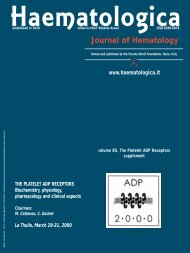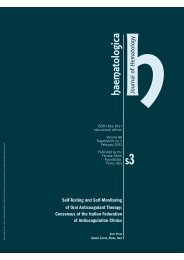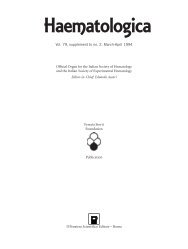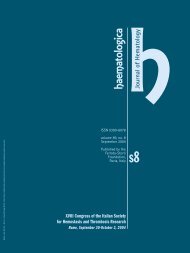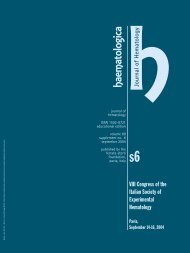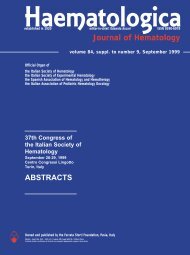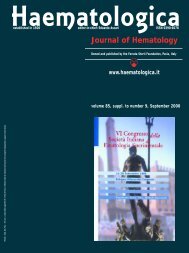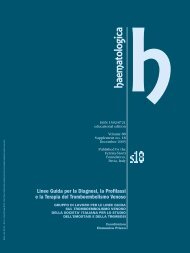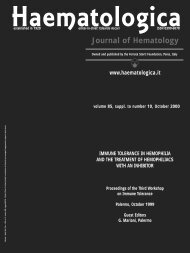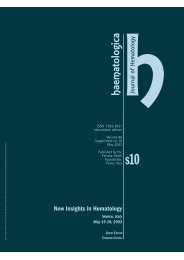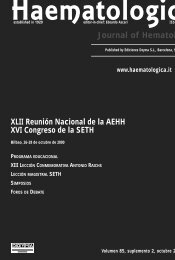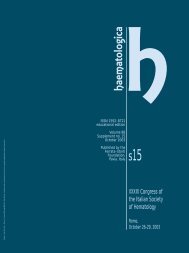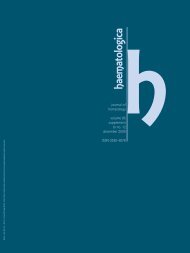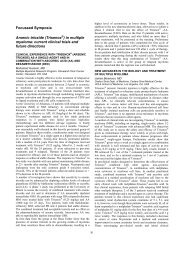2003; baxter - Supplements - Haematologica
2003; baxter - Supplements - Haematologica
2003; baxter - Supplements - Haematologica
- No tags were found...
You also want an ePaper? Increase the reach of your titles
YUMPU automatically turns print PDFs into web optimized ePapers that Google loves.
[Round Table on Immune Tolerance Treatment]review paperPossible advantages ofprotocols with a waiting phaseto treat inhibitors againstfactor VIIIhaematologica <strong>2003</strong>; 88(suppl. n. 12):40-41http://www.haematologica.org/free/immunotolerance2001.pdfR. KOBELTHämophiliezentrum, Wabern and Childrens Hospital of theUniversity of Berne, SwitzerlandAfter the detection of an inhibitor in apatient with hemophilia A , the immediatestart of an immune tolerance induction(ITI) is usually recommended. 1 This can be difficultto carry out for smaller centers, lacking therequired experience with this type of treatment.The registry of the Immune Tolerance Study Group(ITSG) shows that about 40% of these patientshave, in fact, only been placed on ITI after alonger delay. No details are known about thetherapeutic measures used in the time of delay. 2The question will be discussed of how an adequateprotocol could not only keep the patientsin good health during this waiting phase but perhapsmight even be of some advantage for them.Retrospective evaluations from ITI registrieshave shown a number of variables positivelyaffecting the duration and the outcome of ITI.Some of them are:— low inhibitor titer at the onset of ITI; 2-4— no repeated boosting of the inhibitor or lowhistorical inhibitor titer; 2,3,4— no interruptions of ITI; 5— High-dose ITI-regimen. 2These variables can be influenced by an appropriatetreatment protocol: early detection of aninhibitor by frequent testing during the first daysof treatment. This prevents further boostingfrom being given, which could, at least in somepatients, lead to increasingly high titers of theinhibitor. Therefore, in case of a positive result,the administration of standard factor concentrateshas to be immediately stopped and treatmenton demand with recombinant factor VIIa(rFVlla) has to be started. This product usuallyshows a very good efficacy in the type of bleedsseen in young patients mostly affected byCorrespondence: R. Kobelt, Hämophiliezentrum, Seftigenstrasse240, CH-3084 Wabern and Childrens Hospital of the Universityof Berne, Switzerland.inhibitors. 6-8 This waiting phase (delay of ITI)allow transient inhibitors to be excluded and theoptimal moment to start the ITI to be reached:the often difficult venous access of the childrencan be improved, and if necessary a port-systemcan be installed before starting ITI. All personsinvolved, including the family of the patient, canbe thorougly prepared for the treatment. 9,10Finally, the inhibitor can be allowed to fall,hopefully to a titer of 10 BU or less, before treatmentwith a high-dose ITI-regimen according tothe Bonn-protocol is initiated.This protocol is intended to optimize ITI bypreventing further boosting of the inhibitor titerand by delaying the start until an uninterruptedcourse can be expected. Starting at a low level ofthe inhibitor probably additionally improves theoutcome of the treatment and might optimizethe costs by reducing the duration and thus theconsumed quantity of FVIII product. 7,11 To datethere are only a few documented cases treatedaccording to such a protocol. 8,12 To prove thishypothesis more cases would be necessary.References1. Brackmann HH, Lenk H, Scharrer I, Auerswald G, KreuzW. German recommendations for immune tolerancetherapy in type A haemophiliacs with antibodies. Haemophilia1999; 5:203-6.2. Mariani G, Kroner B. Immune tolerance in hemophiliawith factor VIII inhibitor: predictors of success.<strong>Haematologica</strong> 2001; 86:1186-93.3. Lenk H anf the ITT Study Group. The German registryof immune tolerance treatment in haemophilia - 1999update. <strong>Haematologica</strong> 2000; 85(suppl to n. 10):45-7.4. DiMichele D, Kroner BL. Analysis of the North-AmericanImmune Tolerance Registry (NAITR) 1993-1997:current practice implications. Vox Sang 1999; 77(suppl1):31-2.5. Oldenburg J, Schwaab R, Brackmann HH. Induction ofimmune tolerance in haemophilia A inhibitor patientsby the 'Bonn Protocol': predictive parameters for therapyduration and outcome. Vox Sang 1999; (Suppl.1):49-54.6. Key NS, Aledort LM, Beardsley D, et al. Home treatmentof mild to moderate bleeding episodes usingrecombinant factor Vlla (NovoSeven) in haemophiliacswith inhibitor. Thromb Haemost 1998; 80:912-8.haematologica vol. 88(supplement n. 12):september <strong>2003</strong>



